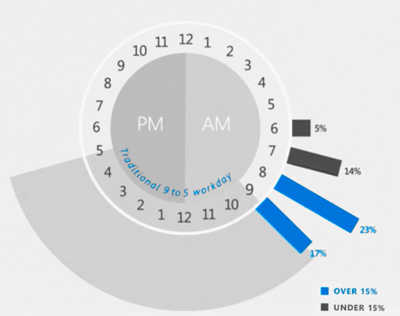When it comes to the modern workplace, employers who have barely been adapting to the common needs of millennials now has a new challenge on their hands—the wants, needs, skills, capabilities and workplace behavior of the new kids in town: Generation Z. There are many differences but also similarities between millennials' office behavior and Gen Z' office behavior. This is why, we created this guide to better understand Millennials and Gen Z at the workplace.
While millennials are now grown-ups, have become homeowners, parents, and are moving into management and leader roles at work. Generation Z are only at the beginning of their career. Generational studies prove to us that they are far more complex than pop culture would lead us to believe — which is why it is vitally important that employers understand these differences and what they can do to attract and retain the freshest talent on the market. To better understand the fast-changing workforce and those generations' office behavior, let us take a closer look at what sets them apart: Millennials versus Gen Z.
Who Are Millennials and Gen Z?
Millennials, also known as Generation Y or the Net Generation, are the demographic cohort following Generation X. Demographers and researchers typically use the early 1980s as starting birth years and the mid-1990s to early 2000s as the ending.
Generation Z (also known as Post-Millennials, the iGeneration, Plurals, Gen Tech, Homelanders, Digital Natives) is the demographic cohort after the Millennials. Demographers and researchers typically use the mid-2000s as starting birth years. There is little agreement about ending birth years.
Characteristics
Members of the Millennial are sometimes called "digital natives" because they grew up with technology such as the internet, computers, phones, and social media. They are also known as the "Me Generation" or "Echo Boomers" because they are the children of Baby Boomers.
Members of Generation Z is the most diverse generation in history — 48% of Gen Z is comprised of Hispanic/Latinx, African American, Asian American, Pacific Islander (AAPI), or another non-white racial group.
Gen Z office behavior trends in the workplace
The percentage of millennials in the workforce is on the rise, quickly becoming the dominant demographic in many industries. This is especially true in the office, where millennials now make up the majority of workers. Overall, millennials make up about 37% of the workforce today.
However, this trend has a downside — as more millennials enter the workforce, they are starting to feel saturated. In other words, they feel overworked and undervalued, and many are beginning to question whether their jobs are worth the stress affecting Millennials' office behavior.
This problem is compounded by the fact that Gen Z workers are also entering the workforce in large numbers. Like millennials, Gen Z workers are highly educated and have high career expectations. However, unlike millennials, Gen Z office behavior is defined by their impatience for jobs that do not meet their standards. By 2025, Gen Z is expected to comprise about 27% of the global workforce.
As a result, the saturation of millennials and Gen Z workers in the office leads to frustration and dissatisfaction. Many workers feel burnt out, and some are quitting their jobs altogether. But it is not all doom and gloom. There are things that workplaces can do to help Millennial and Gen Z workers with burnout and frustration. Here are a few tips:
Be Flexible with Work Hours
Try to be more flexible with work hours. Hybrid working is on the rise to adapt to the needs of the current workforce. Allow employees to work from anywhere when possible, and do not require them to be in the office for set hours.
Offer Opportunities for Career Growth
Offer employees opportunities to take on new challenges and learn new skills. This will help them feel more engaged in their work and less likely to burn out.
Create a Supportive Environment
Try to create the ideal office design with your employees' needs in mind. Also, go for a more supportive environment where you make sure to encourage employees to collaborate, and offer mentorship opportunities.
Be Transparent About Company Goals
Millennials and Gen Z workers want to know that their work is meaningful. Be transparent about the company's goals, and explain how each employee's work contributes to those goals. It is important for especially Gen Z'ers to feel that they can align their own values with the company values.

Education and Desired Training
Today, the landscape has shifted. With the advent of the internet and digital technology, education has become more about effectively using these tools to find and synthesize information.
This shift has profoundly impacted how Millennials and Gen Z's learn and think about education, affecting both the millennials' office behavior and Gen Z office behavior. For these digital natives, education is no longer something that happens in a classroom from 9-5; instead, it is an ongoing process inside and outside traditional educational institutions.
There are a few key ways in which Gen Z students differ from their Millennial predecessors regarding learning. For one, Gen Z students are far more independent and self-directed than Millennials. They prefer to learn by doing and tend to gravitate towards active learning environments rather than passive ones. This can be attributed to the fact that they grew up in a world where connected technologies were no longer novel but normal.
Another key difference is that Gen Z students are much more aware of the need for lifelong learning and career development. They understand that the world is changing rapidly and need to update their skills to stay ahead of the curve continuously. This has led to an increase in demand for on-the-job training and development programs.
Recruitment Preferences
As the workforce continues to evolve, so do the preferences of job seekers. Recruiters must be aware of the latest trends to successfully attract top talent.
There are a few key differences between recruitment preferences in millennials versus Gen Z. For one, 23% of Gen Z candidates have experienced an almost exclusively digital hiring experience, compared to just 14% of millennials. This means that if your recruitment methods are outdated, you could be missing out on a large portion of qualified candidates.
Additionally, 46% of Gen Z job seekers have applied for a job or internship from a mobile device, compared to 38% of employed millennials. This trend will only continue to grow, so it is essential to make sure your application process is mobile-friendly.
Finally, 54% of Gen Z job seekers say they would not complete an application if your recruiting methods are outdated. This is a stark contrast to millennials, who are more likely to overlook outdated recruiting methods.
How Millennials and Gen Z Look for Work
For starters, both generations are heavy and skilled users of technology. This means they are used to getting the information they need from the internet. Whether looking for a job or just researching a company, they will likely turn to the internet first.
This also means that they are used to applying for jobs online. Many millennials and Gen Z's say they would never even consider applying for a job if they did not offer the opportunity to fill out an online application.
Of course, this does not mean that all millennials and Gen Z's are the same. There are still some differences between the two groups. For example, millennials are more likely to move around in their careers. They are also more likely to start their own businesses. Gen Z's, on the other hand, tends to be more loyal to one employer. But when looking for work, both groups are likely to use the same methods: online job boards, social media, and word-of-mouth.
Desired Flexibility at Work
Millennials are often considered the pioneer generation when it comes to workplace flexibility. This is mainly because many millennials entered the workforce during an economic recession and were, therefore, more willing to trade traditional 9-5 schedules for more flexible arrangements.
However, as the workforce continues to evolve, so does millennials' office behavior. A recent study by Verizon found that 71% of millennials would leave their current job if it did not offer flexible working arrangements.
In contrast, Gen Z is just now entering the workforce and has very different expectations regarding work-life balance. Even though they might not leave a job for not giving them the option for flexible work schedules, according to a report by FlexJobs, 75% of Gen Z respondents did say that a flexible job would be "extremely important" to them when considering a job offer.
Many companies are already adapting to the office behaviors of Millennials vs. Gen Z. Microsoft Teams noted in their last report, that people seem to get their work done when they have time, and on their own schedule. Their data shows that people are working more frequently in the morning and evening hours. Teams chats in these times outside of the typical workday, have increased between 15% and 23%. Actually, people also work during the weekend and Teams chats on a Saturday and Sunday have increased over 200%.

Percentage change of Microsoft Teams chats Adapted from: Microsoft Teams Report
Top career priorities
Here is a look at the top career priorities for Millennials vs. Gen Z, based on recent studies:
Millennials:
- Work/life balance (39%)
- Learning and Development (29%)
- Competitive pay (27%)
- Meaningful work (26%)
- Career growth (24%)
- Workplace culture (23%)
Gen Z:
- Work/life balance (32%)
- Learning and Development (29%)
- Competitive pay (24%)
- Meaningful work (21%)
- Career growth (23%)
- Workplace culture (23%)
Differences between Millennials and Gen Z are not huge, and we do see many similarities, which basically only makes it easier to adapt to the two generations' office behavior. In general, we see many companies that are looking to support their needs and are continuously adding flexibility around hours worked and location. Some 43% of companies are offering hybrid work models, and benefits focusing on financial and mental wellness are becoming more popular, and other perks like four-day workweeks, sabbaticals and work-from-anywhere are popping up.
What have we learned about Millennials versus Gen Z?
Navigating the dynamics of modern work demands a deeper understanding of both the Millennial and Gen Z cohorts. While these groups undeniably share common values, such as the desire for a harmonious work/life balance and a thirst for continuous learning, their individual nuances cannot be ignored. They've clearly signaled a shift away from the traditional 9-5 paradigm. This trend is evident in data from platforms like Microsoft Teams, which indicates increased activity during unconventional hours, including early mornings, late evenings, and weekends.
It's essential for today's employers to recognize and adapt to these shifts. Embracing more flexible working hours, fostering open and transparent communication, and ensuring roles are imbued with a sense of purpose and meaning are key strategies to appeal to these demographics. Additionally, recruitment strategies need to be attuned to the digital preferences of these tech-savvy groups, emphasizing a seamless online experience.
As Millennials advance to leadership positions and Gen Z becomes an even more significant part of the workforce, organizations that successfully integrate these elements will not only foster a positive work environment but will also position themselves as coveted destinations for the best and brightest of these dynamic generations.



